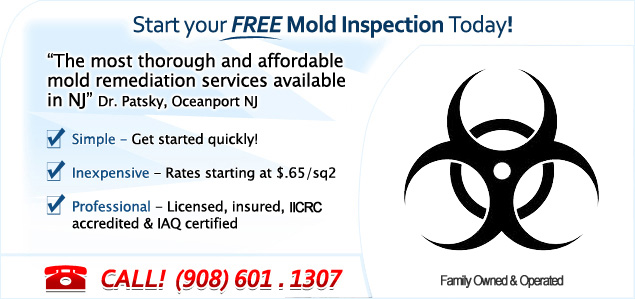Truth About Black Mold
How Dangerous Is The Mold In Your NJ Home?
If you believe you need mold remediation, don’t panic!
Occasionally we meet homeowners who are very well versed on mold. Though to be honest it’s common.
Most people aren’t licensed toxicologists or microbial scientists. But they have no problem reading something online & telling you how dangerous mold is. Then people contact us freaking out about the mold in their home.
Mold can be dangerous. The problem is it’s usually not dangerous how you think.
To even assume that mold is dangerous, first you need to meet 2 criteria:
- Cosmetic mold vs non-cosmetic mold. Cosmetic mold is never dangerous.
- Regular access to copious amounts of water.
Criteria 1 – Is the mold cosmetic or non-cosmetic?
Cosmetic mold grows on hard, non-porous surfaces. This can be vinyl, metal, marble, plastic, any surface that is smooth or hard. You will see this mold in your shower. Sometimes your AC.
This type of mold doesn’t cluster tightly. It forms sporadic, loose, poka dot like clusters. For mold to become toxic it has to mature. If the hyphae (roots) of mold can’t penetrate into a surface to absorb nutrients, it can not mature. Thus non-cosmetic mold is usually never dangerous.
Non-cosmetic mold is different. It grows on soft, porous material like wood, sheetrock or insulation. This type of mold can penetrate deep & form strong hyphae that feed the mycellium. You usually see this mold on sheetrock, wood or insulation. It also can grow on grains, rice or food.
Criteria 2 – Does the mold have *regular access to copious amounts of water?
Mold needs much more water than people understand. Take the shower. Mold loves to grow in showers. It gets regular water flow. Problem is the surfaces of showers are naturally mold resistant. Even though you can see what appears to be lots of mold, it can never mature to the point of becoming really toxic.
If mold is growing on wood, sheetrock or insulation this is different. For humidity to cause maturation, mold will need high humidity, over 60% for 2-3 months to reach this stage.
The other way mold can reach maturation is from a dripping water pipe or an external water leak during rainy seasons. Rainy seasons in New Jersey are between April to early September. This is when it’s most likely for mold to mature.
Mold Can Still Cause Structural Problems, Which Indirectly Poses Risk by Damaging Frames or Foundations – Leading To Failure.
This is a caveat that’s sometimes missed. The mold in your home might not be mature enough to produce toxins. But it can still eat away, degrade or devour the structure of your home. This leads to rapid aging. Which can cause structrual failure or collapse.
And this is a much more likely problem. Non-toxic mold colonies can still chew holes right through your floor. It can eat through wooden beams. It can weaken your attic or basement. These are all factors that a certified mold inspector will assess.
If you live in New Jersey & have questions about the mold in your home, give us a call!
For more information on black mold, Dr Campbell has a good video we recommend. It can sound alarming at first but this type of mold doesn’t grow on wall AC units. Sometimes it can grow inside an HVAC system or inside of walls, but it all depends on how much access to water the mold has.
Dr. Andrew Campbell goes deep into the effects of mold mycotoxins on the human body. He has wrote many medical journals for the CDC and National Institute of Health. You can find his video here for free:
Mold removal in NJ can help keep your home and family safe. Additional resources on mold can be found below:
For basic facts about mold – http://www.cdc.gov/mold/stachy.htm
Health issues concerning mold – http://en.wikipedia.org/wiki/Mold_health_issues
Mold litigation & law for rentals – http://www.nolo.com/legal-encyclopedia/mold-rentals-landlord-liability-responsibility-prevention-30230.html
Aflatoxin (a very common mold mycotxin) – the prevalence and dangers associated with it: http://en.wikipedia.org/wiki/Aflatoxin
For mold removel questions, feel free to contact our senior inspector at: 908-601-1307.
Sincerely – The MMRG Team

